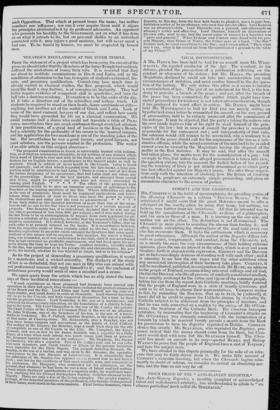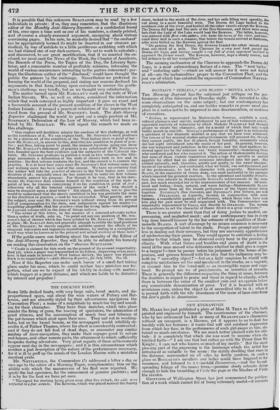PIOUS FRAUD OF THE "ANTI-SLAVERY REPORTER." THE Anti-Slavery .Reporter, a
monthly pamphlet of acknowledged talent and well-deserved celebrity, has condescended to allude to "am obscure periodical work called the SPECTATOR." It is possible that this unknown SPECTATOR may be read by a few individuals in private : if SO, they may remember, that the illustrious editor of the Monthly Anti-Slavery Reporter, or a confidential friend of his, once upon a time sent us one of his numbers, a closely printed: and of course a closely-reasoned argument, occupying about sixteen, convincing pages. In his note, he modestly desired that "the enclosed" (as he appropriately termed it) might be inserted in our obscure pe- riodical, by way of antidote to a little pestiferous scribbling with which we had stained one of our dark corners. We set to work to calculate; and discovered, to our great mortification, that if we inserted the en- closed, we must omit the News of the Week, the Chapter of Accidents, the Records of the Press, the Topics of the Day, the Literary Spec- tator, and a reasonable number of profitable columns, informing the world of various occurrences interesting to the parties concerned: per- haps the illustrious author of the "Enclosed," would have thought the public the gainers by the exchange. Nevertheless we preferred in- forming the world of the proposal, and stating our reasons declined his arguments in that form, taking upon ourselves to Answer the gentle- man's challenge very briefly, but as we thought very satisfactorily. The matter turned upon Mr. BARCLAY's work on the state of West Indian Slavery. We, as well as others, considered the information which that work conveyed as highly important : it gave an exact and a favourable account of the present condition of the slaves in the West Indian Islands : it formed a practical refutation of the impression de- rived from the perusal of Mr. STEPHEN's book. The Anti-Slavery Reporter challenged the world to point out a single position of Mr. STEPHEN'S Delineation of the Law of Slavery, which had been re- futed by Mr. BARCLAY. We will repeat the remark we made on this challenge.
"Our readers will doubtless admire the candour of this challenge, as well as the confidence of it. We can explain both. Mr. STEPHEN'S work professes to be a statemant of the condition of the West Indian slave in point of law : now Mr. BAscLAy, in answer to this, describes his condition in point of prac- tice; and thus, taking point by point, the meanest leguleius going can show that Mr. BARCLAY'S statement of practice is no rebuttnent of Mr. STEPHEN'S law, founded upon the best evidence and the authority of the Colonial sta- tutes. Mr. STEPHEN professes to publish e work in two volumes—the title- page announces a delineation of the state of slavery both in law and in practice : the first volume contains the law, and the second is to contain the practice. It is at least four years since Mr. STF,PIIEN'S first volume came out, and nothing more has been said of the second. We have no certainty that the author will take the practice of slavery in the West Indies into consi- deration at all ; especially since.he has contrived to make his first volume abundantly answer his purpose. For though it be true, that in his state- ments Mr. STEPHEN does confine himself to the condition of the slave in point of law, he reasons concerning it on his condition in point of fact ; otherwise why all the boasted eloquence of' the work ? why should a man be eloquent upon a dead letter ? His object, doubtless, was to give the world to understand that the slave's condition in law was precisely the same as his condition in practice --and he has succeeded. -What person, new to the subject, ever read Mr. STEPHEN'S work without rising from its perusal full of commiseration for the slave, and indignation against his master ?- forgetting altogettfer, 'that the practice—that the living facts—were relegated to a second volume still in the state of things unborn. "The writer of this letter, in the manner of a retained advocate rather than a seeker of truth, asks us, to point out any one position of Mr. STE- P HEN'S law of slavery which has been refuted by Mr. BARCLAY.' The answer is plain : Mr. BARCLAY does not generally attempt to refute the legal positions of Mr. STEPHEN; he merely supplies an antidote against the effects of his eloquent inferences and ingenious mystifications, by stating in a straightfor- ward way what he knows as to the present and actual working of these laws."
If the public cares one farthing about the morality of the Editor of the Anti-Slavery Reporter, they will be able to estimate his honesty on reading this observation on the "obscure SPECTATOR."
"Credit is claimed for this work on the ground of its avowed impartiality. And yet, when a paper was transmitted to its Editor, disproving every asser- tion it had made in favour of West Indian slavery, the paper was rejected. Such is its impartialityl—Anti-Slavery Reporter, for July 1829. No. 50.
Now if this Reporter can make such havoc of a small fact taking place under his nose, which he could neither have mistaken nor for- gotten, what are we to expect of his fidelity in dealing with matters which happen at a great distance; and which are liable to be distorted by interest and prejudice?



















 Previous page
Previous page